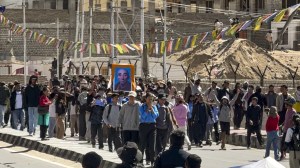Now, Iraqis seek control of oil
Iraq's leaders, flexing muscles as the US prepares to cede sovereignty, are sending a delegation to the UN to demand control of their oil an...

Iraq’s leaders, flexing muscles as the US prepares to cede sovereignty, are sending a delegation to the UN to demand control of their oil and an end to reparations they pay for Saddam Hussein’s wars.
Deputy Foreign Minister Hamid Bayati said on Tuesday that the embryonic government in Baghdad would demand a say this week in a new UN resolution on the country’s affairs. Iraq’s Interior Minister said he believed his security forces would be in a position to replace Americans for most tasks within months.
Following Monday’s car bomb assassination of the head of their Governing Council, the Iraqis who will be running the country after the handover of power on June 30 are increasingly dismayed not only at the US failure to provide security but also at limits on their new sovereignty.
‘‘Iraq must have a say in the next UN resolution,’’ Bayati said. ‘‘We will negotiate on the basis that Iraq must be fully in charge of its resource wealth, and the five per cent of oil revenues we pay (in war reparations) must be reduced further.’’ Washington wants an international board that monitors Iraq’s oil accounts to remain in place after the June 30 handover.
Iraq also still owes some $280 billion in reparations for Saddam’s 1990 invasion of Kuwait, a vast sum compared to the $9 billion its ravaged oil industry earned since the US invasion.
Planning Minister Mehdi Al-Hafedh, a candidate for PM, said: ‘‘It is unjust for Iraq to pay for the crimes of Saddam with its future.’’ Debate over a new resolution to give a UN seal of approval to the handover plan and to the new Iraqi administration has given critics of the US invasion a chance to criticise Washington as half-hearted on the transfer.
There were fresh clashes in southern Iraq between US troops and militia loyal to Shi’ite cleric Moqtada Al-Sadr. In Karbala, they fought running battles around dawn that killed at least eight Iraqis and wounded 13. — (Reuters)





- 01
- 02
- 03
- 04
- 05


























